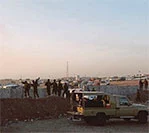NEGLIGENCE: Western intervention in Arab world cause of woes
EVERY day, we are bombarded with news of the radical group Islamic State (IS, formerly the Islamic State of Iraq and the Levant, Isil) and how its ambitions and prowess are growing. Intelligence reports now claim that the movement is not only spreading, but that it has captured more than a thousand armoured Humvees, GPS-directed howitzers, rockets, guided missiles, and — if latest reports are correct — may even be in possession of fighter aircraft after an air force base in Syria was overrun by them. It is clear that the movement is not your ordinary, run-of-the-mill local militia unit, but rather, a disciplined force that is morphing into an army in all but name only.
The Western powers, bogged as they are by the mess in Ukraine, and unable to extend and project their military defensive capabilities, are unable to do much to stop the spread of IS, which is now issuing threats against the Arab states to the west of Iraq and Syria. The question is this: How and why did such a movement emerge, and what were the conditions of possibility that allowed it to rise and spread so fast?
Part of the answer lies in the failure of the “regime change” strategy that was employed in Iraq. As in other instances of military intervention in the Arab-Muslim world, Iraq was militarily defeated and then governed by proxy by civilian technocrats like Paul Bremer, who was given the task of creating a new state and government out of the rubble that was left behind.
The promotion and support given to the Nouri al-Maliki administration was, perhaps, the first step in what later became one of the biggest mistakes ever, for Maliki’s intense suspicion of his Sunni Iraqi counterparts meant that large sections of the Sunni security forces were disbanded, along with more than 500 members of Iraqi intelligence, who were also Sunni. By doing this, the Maliki administration had not only intensified sectarian conflict in the country, but also robbed the Iraqi state of its security apparatus — the only thing that could have checked the advance of radical groups there. The fact that IS is so well armed also speaks volumes about the negligence of those states that had intervened in Iraq, and who later simply left behind their weapons to be picked up by any group that came along.
Today, IS has evolved and spread even further, and threatens to expand its sphere of influence across the Arab world and threatening the monarchies there as well. But despite their rhetoric of supra-state ambitions, this effectively means threatening the sovereignty of every Arab state in the Middle East and Muslim monarchies worldwide. The chaos this will cause will lead to the weakening of Muslim states the world over, creating the so-called “arch of chaos” that extends from Morocco to Southeast Asia, and threatening to destabilise the Muslim world and its economies in toto.
How can this possibly be to the benefit of Islam and Muslims? Whose interests are really being served here — Muslims or those who wish to see a weakening, even destruction, of Muslim political and economic independence? I am wary of conspiracy theories about the origins of IS and am not inclined to speculate about who or what lies behind it. The fact is that in the murky world of “black ops”, there are always hands and hidden hands, puppets and puppet masters.
The sad reality is that in so many Muslim societies today, there are millions of young, angry, frustrated and disenfranchised Muslims who feel that they have nothing to lose by giving their support to movements like IS. And, for the poor Iraqis who have had to live in a state of uncertainty and instability for more than a decade, hope seems lost for an entire generation.
The “regime change” that was lauded by some has not led to the creation of a stable Iraqi state, but rather, a society even more divided and lawless, creating the most fertile ground for the recruitment of radicals. The young men (and women) who join these groups may also feel that such a move is empowering for them, giving them a cause to fight for and a reason to live. But, they may not be aware that they may be the pawns of a bigger game that they themselves do not understand and have fallen into a pit-trap dug right before their feet.
As we face the challenge of dealing with IS, we need to remember two crucial things: Firstly, that the nation-state still matters in the world today, for it is the dominant paradigm in international relations, economics and geopolitics. The dream of by-passing the state and the longing to live in some golden age of the past may be attractive to some, but rhetoric and nostalgia will not put food on your table, a roof over your head or defend your territory in the long run.
The second thing we need to remember is that groups like IS are not only a threat to the present, but also the civilisational legacy of the past. IS has stolen headlines worldwide and given the impression that Arabs today can only turn to the gun whenever they are faced by challenges in the modern world. But we should never, ever, forget the Arab world’s vast contribution to modernity, and the intellectual legacy of thinkers like Ibn Khaldun, al-Ghazali, Ibn Sina, Ibn Rush, al-Biruni and others. The chaos of the present has dealt a sad blow to the Arabs of today and marks a sad betrayal of the noble efforts of so many great Arab-Muslim thinkers of the past.
Article by Farish Noor which appeared in The New Straits Times,
8 September 2014.





